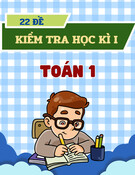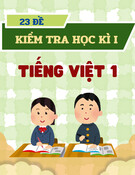
PHÒNG GD&ĐT KON RẪY
ĐỀ KIỂM TRA GIỮA HỌC KÌ II
TRƯỜNG THCS ĐĂK RVE
NĂM HỌC: 2022-2023
Môn: Tiếng Anh
Lớp: 9…
Thời gian: 60 phút (không kể thời gian phát đề)
Họ và tên:…………………………………….
A. LISTENING (2.5pts)
Task1. Listen carefully and choose the best answer (A, B or C) to complete each
sentence.(1.25pts)
1. What is the purpose of the woman's visit?
A. business B. pleasure C. business and pleasure
2. Where will the woman stay during her trip?
A. at a friend's home B. at a hotel C. at a university dormitory3.
3. About how long will the woman be in the country?
A. one or two days B. three or four days C. more than four days
4. What things are in the woman's luggage?
A. clothing, computer, and books
B. CD player, clothing, and books
C. books, gifts and computer
5. What other piece of information do we learn about the woman?
A. Her parents are on the same trip.
B. She enjoys traveling to different countries.
C. She was born in that country
Task 2. Listen and decide whether the following statements are true (T) or false (F).
(1.25 pts)
Statements
T
F
6. Tourism plays an important part in the development of many nations.
7. Modern transport promotes tourism.
8. Tourism depends on the income of a country.
9. People's lives get better with the development of tourism.
10. Tourism helps promote international understanding and cooperation.
B. USE OF ENGLISH. (2.5 pts)
Task 1. Choose one word whose underlined part is pronounced differently.(0.5pt)
11. A.bilingual B.flexible C.official D.Spanish
12. A. dip B.simmer C. grill D. slice
Task 2. Circle the best answer (A,B,C, or D) to complete the sentences.(1.5 pts)
13. Mark the letter A, B, C or D to indicate the word(s) CLOSEST in meaning to the
underlined word in the following sentence in the box below.
I still find a new job exciting
A. look after B. look at C. look down D. look for
14. Mark the letter A, B, C, or D on your answer sheet to indicate the word(s) OPPOSITE
in meaning to the underlined word(s) in in the following sentence in the box below.
You can land a plane on water in emergency.
A. take up B. take off C. take on D. take back
15. Mai can have a conversation in Russian, but she is a …………… rusty.
Mã đề : 901

A. bit B. very C. a little D. much
16. …………..the duck in white wine for an hour before roasting.
A. Dip B. Whisk C.Marinate D. slice
17. In English, the same word can operate as many parts of speech. That's due to its
………….. .
A. variety B. vocabulary C. flexibility D. openness
18. Usually, people from different parts of a country speak their language with different ……….
A. voices B. accents C. speaks D. sounds
Task 3. Use the correct form of the words given in brackets.(0.5pt)
19. If I (be) ……………. fluent in English, I would be offered the job.
20. My grandparents prefer the (simple)………………….of country living.
C. READING.(2.5pts)
Task 1. Read the text and choose A,B,C and D.(1.5pts)
ONLINE SURVEY ON JAPANESE EATING HABITS
Of the 95% of Japanese that eat three meals a day, most people consider dinner to be the
most important. More than 80% of them usually have dinner at home with their families. But
as for what they actually eat, over 60% of Japanese rely on home meal replacement ( ready-
to- eat food bought elsewhere and taken home ) at least once or twice a month. And more than
70% enjoy dining out at least once or twice monthly. This is the picture that emerged when
Trends in Japan conducted an online survey concerning attitudes among Japanese people
toward eating.
For a one- week period beginning February 1,2002,100 people (50 men and 50 women,
with 25 people each in their twenties, thirties,forties, fifties) were asked about their eating
habits. Respondents were first asked which of the three meals was the most important. Named
by 95% , dinner was the overwhelming choice , followed by breakfast(3%) and lunch (2%).
There were no significant differences among gender or age groups. Pollees were next asked
with whom they usually had dinner. “With my family” was the top answer for both men and
women of all age groups, but the figure was 90% for women as compared with 74% for men.
21. .…………….is the most important meal of the day to most Japanese people.
A. Breakfast B. Dinner C. Lunch D. Snack
22.How often do more than half of Japanese rely on ready –to- eat food ?
A. Every weekend B. Every month
C. At least once or twice a month D. Once or twice a week
23. ………….of Japanese enjoy going out for dinner at least once or twice a month.
A. More than 70% B. Over 60% C. More than 80% D. 95%
24.Where was the survey conducted ?
A. Offline B. Online C. At Trends in Japan D. At home
25.How long did the survey last ?
A. On February 1, 2002 B. 6 days C. 7 days D. 8 days
26.The survey showed that most ………chose dinner as the most important meal of the day.
A. Students B. workers C. gender or age groups D. friends
Task 2. Read the passage and decide whether the statements are true (T) or false (F).
(1.0pt)
Tourism can bring many economic and social benefits, but mass tourism is also
associated with negative effects on environment. Some of the main problems are depletion
of natural resources, and pollution.

First, tourism puts pressure on natural resources. As a major cause of the loss of natural
of habitat, tourism directly affects rare and endangered species. An illustration is that over
500 plant species in the Mediterranean are on the verge of extinction. Lack of water is another
problem because during travel seasons, a huge amount of water is used for tourist activities
like swimming pools, golf courses, and accommodations. This leads to periodic water
shortage which already exist in many regions and are likely to spread and increase.
Another concern is pollution. Waste diposal is a serious problem in areas with high
concentrations of tourist activities. The production of wastewater and solid waste in tourist
areas can negatively affect air and water quality. In addition, exhaustion from traffic vehicles
such as buses, trains and especially airplanes is a major source of air pollution.
Statements
T
F
27. Depletion of natural resources is a benefit of tourism.
28.The loss of habitat can affect endangered species.
29. During travel seasons, more water is used than usual.
30. Waste disposal just leads to water pollution.
D. WRITING. (2.5pts)
Task 1. Reorder the words and phrases to make meaningful sentences. (0.5 pt)
31. I /a bit of / picked up /on holiday/ in Phuket/Thai//.
→…………………………………………………………………..
32. has/ English/ borrowed/ words/ many//
→…………………………………………………………………..
Task 2. Rewrite the sentences as one sentence using words given. (1.0 pt)
33. Children eat a lot of sweets. They will have problems with their teeth. (If)
→ If children ........................................................................................
34. It is a camping shop. It has a lot of good equipment. (Which)
→It is a camping shop which................................................................
35. The teacher can't come to class today. He teaches us math. (Who)
→ The teacher who ..............................................................................
36. This book is about animals. I bought it yesterday. ( which)
→ This book which……………………………………………………
Task 3. Write a paragraph (100 - 120 words) about your friend’s eating habits. (1.0pt)
…………………………………………………………………………………………………
…………………………………………………………………………………………………
…………………………………………………………………………………………………
…………………………………………………………………………………………………
…………………………………………………………………………………………………
…………………………………………………………………………………………………
…………………………………………………………………………………………………
…………………………………………………………………………………………………
…………………………………………………………………………………………………
…………………………………………………………………………………………………
…………………………………………………………………………………………………
…………………………………………………………………………………………………
…………………………………………………………………………………………………
______________ The end______________

PHÒNG GD&ĐT KON RẪY
ĐỀ KIỂM TRA GIỮA HỌC KÌ II
TRƯỜNG THCS ĐĂK RVE
NĂM HỌC: 2022-2023
Môn: Tiếng Anh
Lớp: 9…
Thời gian: 60 phút (không kể thời gian phát đề)
Họ và tên:…………………………………….
A. LISTENING (2.5pts)
Task1. Listen carefully and choose the best answer (A, B or C) to complete each
sentence.(1.25pts)
1. What is the purpose of the woman's visit?
A. business B. pleasure C. business and pleasure
2. Where will the woman stay during her trip?
A. at a friend's home B. at a hotel C. at a university dormitory3.
3. About how long will the woman be in the country?
A. one or two days B. three or four days C. more than four days
4. What things are in the woman's luggage?
A. clothing, computer, and books
B. CD player, clothing, and books
C. books, gifts and computer
5. What other piece of information do we learn about the woman?
A. Her parents are on the same trip.
B. She enjoys traveling to different countries.
C. She was born in that country
Task 2. Listen and decide whether the following statements are true (T) or false (F). (1.25
pts)
Statements
T
F
6. Tourism plays an important part in the development of many nations.
7. Modern transport promotes tourism.
8. Tourism depends on the income of a country.
9. People's lives get better with the development of tourism.
10. Tourism helps promote international understanding and cooperation.
B. USE OF ENGLISH. (2.5 pts)
Task 1. Choose one word whose underlined part is pronounced differently.(0.5pt)
11. A. dip B.simmer C. grill D. slice
12. A.bilingual B.flexible C.official D.Spanish
Task 2. Circle the best answer (A,B,C, or D) to complete the sentences.(1.5 pts)
13. …………..the duck in white wine for an hour before roasting.
A. Dip B. Whisk C.Marinate D. slice
14. In English, the same word can operate as many parts of speech. That's due to its …………..
.
A. variety B. vocabulary C. flexibility D. openness
15. Usually, people from different parts of a country speak their language with different ……….
A. voices B. accents C. speaks D. sounds
. Mark the letter A, B, C or D to indicate the word(s) CLOSEST in meaning to the underlined word
in the following sentence in the box below.
Mã đề : 902

I still find a new job exciting
A. look after B. look at C. look down D. look for
17. Mark the letter A, B, C, or D on your answer sheet to indicate the word(s) OPPOSITE in
meaning to the underlined word(s) in in the following sentence in the box below.
You can land a plane on water in emergency.
A. take up B. take off C. take on D. take back
18. Mai can have a conversation in Russian, but she is a …………… rusty.
A. bit B. very C. a little D. much
Task 3. Use the correct form of the words given in brackets.(0.5pt)
19. If I (be) ……………. fluent in English, I would be offered the job.
20. My grandparents prefer the (simple)………………….of country living.
C. READING.(2.5pts)
Task 1. Read the text and choose A,B,C and D.(1.5pts)
ONLINE SURVEY ON JAPANESE EATING HABITS
Of the 95% of Japanese that eat three meals a day, most people consider dinner to be the
most important. More than 80% of them usually have dinner at home with their families. But as
for what they actually eat, over 60% of Japanese rely on home meal replacement ( ready- to- eat
food bought elsewhere and taken home ) at least once or twice a month. And more than 70%
enjoy dining out at least once or twice monthly. This is the picture that emerged when Trends in
Japan conducted an online survey concerning attitudes among Japanese people toward eating.
For a one- week period beginning February 1,2002,100 people (50 men and 50 women, with
25 people each in their twenties, thirties,forties, fifties) were asked about their eating habits.
Respondents were first asked which of the three meals was the most important. Named by 95%
, dinner was the overwhelming choice , followed by breakfast(3%) and lunch (2%). There were
no significant differences among gender or age groups. Pollees were next asked with whom they
usually had dinner. “With my family” was the top answer for both men and women of all age
groups, but the figure was 90% for women as compared with 74% for men.
21. .…………….is the most important meal of the day to most Japanese people.
A. Breakfast B. Dinner C. Lunch D. Snack
22.How often do more than half of Japanese rely on ready –to- eat food ?
A. Every weekend B. Every month
C. At least once or twice a month D. Once or twice a week
23. ………….of Japanese enjoy going out for dinner at least once or twice a month.
A. More than 70% B. Over 60% C. More than 80% D. 95%
24.Where was the survey conducted ?
A. Offline B. Online C. At Trends in Japan D. At home
25.How long did the survey last ?
A. On February 1, 2002 B. 6 days C. 7 days D. 8 days
26.The survey showed that most ………chose dinner as the most important meal of the day.
A. Students B. workers C. gender or age groups D. friends
Task 2. Read the passage and decide whether the statements are true (T) or false (F).
(1.0pt)
Tourism can bring many economic anh social benefits, but mass tourism is also associated
with negative effects on environment. Some of the main problems are depletion of natural
resources, and pollution.






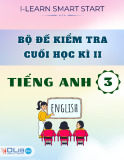
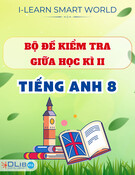
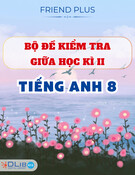
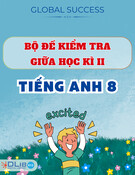
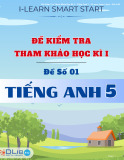
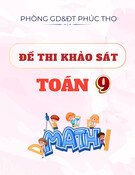
![Đề thi Tiếng Anh có đáp án [kèm lời giải chi tiết]](https://cdn.tailieu.vn/images/document/thumbnail/2025/20250810/duykpmg/135x160/64731754886819.jpg)
